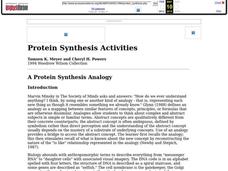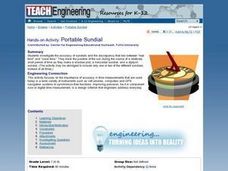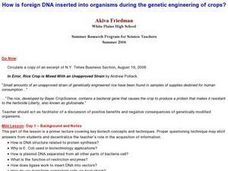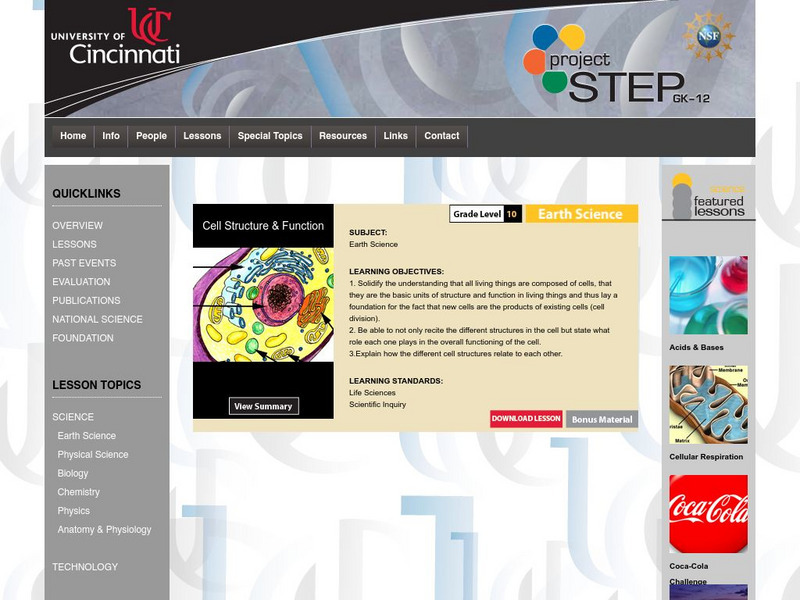Curated OER
Time Lapse Seed Germination with the QX3 Intel Digital Microscope
Young scholars use the time-lapse feature of the QX3 Intel Digital Microscope
to observe germination of seeds. They use the QX3 Intel Digital microscope to create time lapse video films of seed germination experiments.
Curated OER
Protein Synthesis Activities
Pupils compare the process of protein synthesis in an analogy. They simulate the process of protein synthesis kinesthetically using index cards and write a paragraph to explain the process.
Curated OER
Where Do I Belong?
Tenth graders study the diversity of life in the world. They classify and sketch organisms into the 6 kingdoms.
Curated OER
Genes: The Building Blocks of Life
Students examine various topics on genetics. Students explore the Internet to gather information on genetic testing, genetically engineered food, forensics, DNA and cloning. They research and determine the best way to fund each of the...
Curated OER
Collecting Plankton
In this science worksheet, students learn facts about plankton by reading two pages of factual information. Students read about the different kinds of plankton and how it is classified. Detailed drawings are included. There are no...
Curated OER
Respiration
Young scholars explore Adenosine Triphosphate and how energy is released. They examine the basic process of cellular respiration and draw its chemical formula. After describing cellular respiration and photosynthesis, students compare...
Curated OER
Diversity And Adaptations Of Organisms
Seventh graders demonstrate the processes of science by posing questions and investigating phenomena through language, methods and instruments of science. They study the body features or systems of several animals.
Curated OER
The Giant Barrel Sponge
Students study barrel sponges. In this science and art lesson, students discuss what sponges are, create their own sponge, and share what they created with the rest of the class.
Curated OER
Amylase Enzyme In Saliva
Students test for amaylase enzyme in a variety of substances. Student pairs perform a series of tests to determine how long it takes the starch sample to change to sugar molecules and the blue color to disappear when various saliva...
Curated OER
Portable Sundial
Students work together to identify the accuracy of sundials. They track the position of the sun and create a shadow plot. They discover the difference between real time and clock time.
Curated OER
Science Processes
Fifth graders observe a dry piece of bread and a damp piece of bread in two separate sealed bags that have been sitting for several days that have been labeled. The observe the mold with a hand lens and record findings in their science...
Curated OER
Extensions - Biology Review Unit
Students engage in a variety of activities in order to review a Biology unit. For example, they research the Bird Flu, it's history, how it is spread, what has been done about it, what better options exist for controlling or removing it....
Curated OER
Exploring Film Genres for Telling Hero Stories: Animated Shorts
Students will create short movies. The integration of technology into the curriculum is important for learners to apply in various ways. This lesson is an example of that kind of integration.
Curated OER
How is Foreign DNA Inserted into Organisms During the Genetic Engineering of Crops?
Learners examine the positive benefits and negative consequences of genetically modified organisms following a lecture covering key biotech concepts and techniques. Students then conduct and experiment comparing the travel rate of...
Curated OER
Feedback and Flowcharts
Sixth graders explain what a negative feedback system is and they distinguish it from a positive feedback system. They describe examples of how negative feedback is used in both nature and technology. , Students define homeostasis, and...
Curated OER
Dinoflagallates of Bioluminescent Bay
Fifth graders research dinoflagallates of the Bioluminescent Bay. They research the Internet for pictures of the Bio Bay and discuss the difference between ecosystems and ecoregions. They research a marine ecoregion and create a poster.
Curated OER
GPS Receiver Basics
Students practice using a GPS receiver. They walk in different directions and monitor their progress on maps. They enter specific locations and use information given to them to get them back to their original locations.
Curated OER
Revised “Understanding Nutrition” Activity
Students evaluate their current food choices. In this health science lesson, students test different drinks to rate the amount of Vitamin C content. They discuss results in class.
Other
University of Cincinnati: Project Step: Cell Structure and Function
Engaging, interactive instructional activity focusing on cells being the basic units of structure and function of all living things. Students will be able to explain the different roles of each structure and how they relate to each other.
The Wonder of Science
The Wonder of Science: Ms Ls1 2: Cell Parts and Function
Work samples, phenomena, assessment templates, and videos that directly address standard MS-LS1-2: cell parts and function.
PBS
Pbs Learning Media: Cellular Structure and Function
This lesson plan provides an exploration of the structure and function of the cell in organisms. Students will consider the cell as a common unit of life, mitosis, and cell specialization. Includes links to multimedia resources.
Children's Museum
The Children's Museum of Indianapolis: Cells the Living School
Middle schoolers compare the parts of a cell and their functions to their school to understand how a cell's parts work in unison to be effective in the body.
TeachEngineering
Teach Engineering: Cell Membrane Structure and Function
Young scholars learn about the different structures that comprise cell membranes, fulfilling part of the Research and Revise stages of the legacy cycle. Students view online animations of cell membrane dynamics (links provided). Then...
Alabama Learning Exchange
Alex: What's in a Cell?
This lesson focuses on the function of organelles through technology integration. The students will identify the various organelles by using an electronic game. Then, they will construct a Prezi (online presentation) and present their...






















